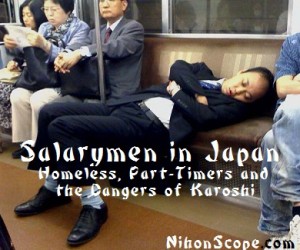 The Dark Life of the Salaryman in Japan
The Dark Life of the Salaryman in Japan
Discover what life is like and the dangers of being apart or disconnected of the Japanese work force.
As I continue my studies of Japanese lifestyles and culture the more I’m inclined to look behind the curtains and see what’s on the other side of the golden do no harm view of Japan. In this case I decided to do some digging on the homeless, the working poor and salarymen of Japan and what the dangers and connections are to these challenges.
The more I read and watch about these challenges of Japan the more I’m able to see what the personal and social truths are to these choices (or to some a forced hand) and with that I see a little bit more of what is really happening inside the heart of Japan. Besides the loss of jobs and the economic decline of Japan, we see the shame society coming to play. There seems to be almost a double edge sword when it comes to either being homeless, a working poor or a salaryman in Japan. On one hand having a stable job and wage to maintain your living standard is what most people hope for, there is also some of the culture who says that it’s not always the best thing to strive for. In fact many of the younger generation are looking at full time work as something to avoid and instead are grouping up together to take care of each other in numbers. This younger generation is still working as part-timers, but they are finding much more freedom to pursue their interests while still being able to live comfortably and securely.
  Working Poor Japan: A Story of Love and Hate |
  Song of the Salaryman |
  Youth Poverty And Death From Overwork In Japan |
But on the other side of this we see those who want to maintain their honor by not burdening society, these people either fall one of two ways. They’re either greeted with an opportunity to work as a Salaryman or they will eventually slip through the cracks to part-time work or eventually homelessness. The more I dug through personal testimonies of people who were either salarymen, part-timers or homeless I couldn’t help see the disaster brewing behind all these options. The pressure to have full-time work from family and society is a rather heavy load to hold, but when one can not perform and gain themselves employment they feel shameful in front of these audiences. Eventually these people will fall into the part-timer, and many see these jobs as roads to no where. So more shame is felt because of this option in work, and with that becoming a part-timer quickly will lead to what is now called in Japan ‘The Working Poor’, because many times unless with help, these people are unable to pay for food, rent and essentials of living. Since these people shun asking for help because of honor, they’ll eventually lead themselves straight to living on the streets to avoid being a burden.
Many of these working poor will actually find themselves staying the night at manga cafe’s for a small fee for the night, only to wake up the next day to go search for work. Then you have your homeless, which mainly consist of the older generation, from before the economic bubble popped. Many of these people feel that once you’re laid off, taking a part-time job is basically signing your own occupational death, as it’s extremely hard to get back on your feet (so they say). So many of them fought for awhile but eventually resigned to be homeless as the fight for work in Japan raged on. But on the farthest side of this challenge we have those with work, and these people are also finding that they are sacrificing much for the opportunity to be a full-time worker. The day in and day out working between 12-18 hours or more a day is not uncommon in Japan. It’s been said that once hired in Japan that you’ll be taken care of as you join the company family, and that may be sort of true still today, but at what costs? As seen in this short film, one literally will give up their life for their work.
More often then not these salaryman never get to see their children born as they’ll be in another city or at work, then when these children grow up they hardly get to know their father as he’ll often be at work before the child wakes up and he’ll come home long after they’ve been asleep, but since he’s the primary breadwinner he can not stop otherwise he’ll risk hurting his families life style and more importantly he’s children’s future. There is great pride in maintaining a family in Japan, but with that comes a great amount of mental fatigue and stress that is put on these people to perform. With that the overworked people of Japan known as salaryman also have dangers that occur while working to the brink of collapse and it’s called karoshi and it means ‘death from over work’.
Karoshi is an ever growing challenge in Japan. Between those who commit suicide and accidentally die after over working are all people considered to have succumb to karoshi. It said that about 300 deaths occur every year from karoshi, but this number which has been supplied by the Ministry of Labor is completely wrong. The Japanese government says that it’s more into the 1000’s, but again they skew the numbers. It said that the main causes of karoshi (‘death from over work’) comes from heart attack, stroke and a starvation diet, but they lack to count the deaths that occur after overworking, such as falling down stairs, getting hit by cars and even at times stumbling on to train tracks, and of course the list goes on and on. So what would the real numbers be?
Of course the definition of karoshi is not seen as the same by all parties. It’s said that with all definition in place of what karoshi is, there is more then 10,000 deaths by karoshi every single year. But the Japanese government continues to keep that on the down low as they much rather take only %10 of this into account. Be it as it may, the challenges of the Japanese economy, specifically of their work force or lack there of has a lot of shaping up to do. On the lighter side of things, there are happy and successful people in all 3 of these categories, so it really comes down to attitude and the state of mind these people are in, and not all salaryman have it to these extremes, but it’s something you will certainly see if you ever visit Japan.
But as I further unravel the Japanese culture I can clearly see how drinking at izakaya’s (bars), pachinko parlors, manga cafes, religion and many other services found in Japan are used to decompress the stresses of every day life in Japan. You can even say that the stress that’s quite normal to an everyday salaryman is also a cause for the lack of sex inside relationships and many times having a relationship to begin with. So as population declines in Japan, we should not just blame the hikikomori’s we must also come to face a growing problem with people literally not getting it on in Japan because of the stressful work conditions. The sex scene throughout Japan is actually declining and many places in Japan which were only available for citizens of the area are now having to open their doors to foreigners… but that’s another story.
For those who thought Japan had no faults think again #brokenfantasy. I find those who really feel this way, are usually hardcore otaku who consume all parts of the entertainment industry of Japan without taking a second look at the people of Japan when considering their next anime fix. But, with that said, I’ll shine through some of my own otakuness and share with you an anime movie called ‘Tokyo Godfather’s” which is a story of a group of homeless that end up taking care of a baby.
You can watch Tokyo Godfather HERE. (coming soon).

